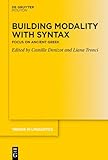Building Modality with Syntax : Focus on Ancient Greek / ed. by Camille Denizot, Liana Tronci.
Material type: TextSeries: Trends in Linguistics. Studies and Monographs [TiLSM] ; 372Publisher: Berlin ; Boston : De Gruyter Mouton, [2023]Copyright date: ©2023Description: 1 online resource (X, 269 p.)Content type:
TextSeries: Trends in Linguistics. Studies and Monographs [TiLSM] ; 372Publisher: Berlin ; Boston : De Gruyter Mouton, [2023]Copyright date: ©2023Description: 1 online resource (X, 269 p.)Content type: - 9783110778052
- 9783110778526
- 9783110778380
- 415
- online - DeGruyter
- Issued also in print.
| Item type | Current library | Call number | URL | Status | Notes | Barcode | |
|---|---|---|---|---|---|---|---|
 eBook
eBook
|
Biblioteca "Angelicum" Pont. Univ. S.Tommaso d'Aquino Nuvola online | online - DeGruyter (Browse shelf(Opens below)) | Online access | Not for loan (Accesso limitato) | Accesso per gli utenti autorizzati / Access for authorized users | (dgr)9783110778380 |
Frontmatter -- Editors’ acknowledgments -- Contents -- List of abbreviations -- 1 For a syntactic approach to modality and its application to Ancient Greek -- 2 Modal uses of knowledge verbs in Ancient Greek -- 3 Information source and complementation in Classical Greek. The case of verbs of seeing and knowledge acquisition -- 4 Syntactic patterns of modality in temporal clauses: Hóte vs. hótan in the diachrony of Ancient Greek -- 5 Variation and change of counterfactual conditionals in Postclassical Greek: Evidence from private papyrus letters -- 6 Conditional subordinate clauses and verbal moods. A case study -- 7 (Inter)subjectivity, modality, and syntax in Classical Greek: Dokéō and phaínomai in addressee-oriented assertions in the dialogues of Plato -- 8 A pragmatic syntax of counterfactual mood attraction and mood (a)symmetry from Archaic to Classical Greek -- 9 Mood, modality and speech acts in clause combination. The case of conditionals -- List of contributors -- Index locorum -- Index verborum -- Index notionum
restricted access online access with authorization star
http://purl.org/coar/access_right/c_16ec
Despite the intensive research carried out in recent years, modality remains an intriguing and challenging issue in linguistics. This book investigates modality from a syntactic viewpoint and with a bottom-up approach. A strong focus of the book is the interaction between the different linguistic tools that build modality (moods, modal verbs, modal adverbs, etc.), taking both the role of syntactic structure and the compositionality of modal meanings into account. The volume comprises corpus-based studies devoted to several syntactic aspects of modality in Ancient Greek, within different theoretical frameworks. The chapters shed new light on different modal categories (e.g. epistemicity, possibility, counterfactuality, evidentiality, subjectivity) and show how these modal meanings arise from the combination of different linguistic devices in specific syntactic contexts (e.g. combinations of modal elements, types of main and dependent clauses, types of illocutionary acts, etc.). By approaching modality from a different perspective and providing an up-to-date discussion of several aspects of modality, the book makes a significant contribution to current debates.
Issued also in print.
Mode of access: Internet via World Wide Web.
In English.
Description based on online resource; title from PDF title page (publisher's Web site, viewed 25. Jun 2024)


